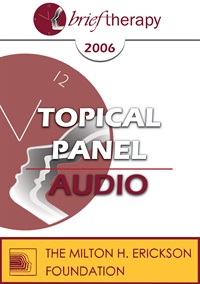BT06 Topical Panel 10 - Person of the Therapist - Ellyn Bader, PhD; Jeffrey Kottler, PhD; John Norcross, PhD; Ernest Rossi, PhD
- Average Rating:
- Not yet rated
- Topic Areas:
- Topical Panels | Therapist Development | Clinical Psychology | Neuroscience
- Categories:
- Brief Therapy Conference | Brief Therapy Conference 2006 | Pioneers in Couples and Family Therapy
- Faculty:
- Ellyn Bader, PhD | Jeffrey Kottler, PhD | John C. Norcross, PhD | Ernest Rossi, PhD
- Duration:
- 56:31
- Format:
- Audio Only
- Original Program Date:
- Dec 08, 2006
- License:
- Never Expires.
Description
Description: A panel of expert therapists explores the critical role of the therapist's personal qualities in effective psychotherapy, revealing how authentic relationships, empathy, and self-development are key to therapeutic success. Panelists share personal stories and research demonstrating that the therapist's presence and connection often matter more than specific treatment techniques.
Educational Objectives:
- To describe the use of brief therapy techniques in specific clinical situations.
*Sessions may be edited for content and to preserve confidentiality*
Credits
Handouts
| Timestamped Transcript (880.4 KB) | 20 Pages | Available after Purchase |
| Ericksonian Learning Snapshot (248 KB) | 2 Pages | Available after Purchase |
Faculty

Ellyn Bader, PhD Related Seminars and Products
Ellyn Bader, PhD, is a founder and director of The Couples Institute in Menlo Park, California. As a clinical psychologist, workshop leader, author, and speaker, she is dedicated to helping couples create extraordinary relationships. Over the past 30 years she has trained therapists in couples therapy throughout the United States as well as Europe, Asia, South America, and Australia. She served as a Clinical Faculty in Stanford University School of Medicine for 8 years.

Jeffrey Kottler, PhD Related Seminars and Products
JEFFREY KOTTLER, PhD, is the author of 80 books including a dozen texts for counsellors and therapists that are used in universities around the world, and many classics for practicing therapists and educators. Some of his most highly regarded works include: On Being a Therapist, The Client Who Changed Me, Divine Madness, Changing People’s Lives While Transforming Your Own, and more recently, The Assassin and the Therapist: An Exploration of Truth in Psychotherapy and in Life and Creative Breakthroughs in Therapy: Tales of Transformation and Astonishment. Dr. Kottler has served as a Fulbright Scholar and Senior Lecturer in Peru, Thailand, and Iceland, as well as worked as a Visiting Professor in New Zealand, Australia, Hong Kong, Singapore, and Nepal. Jeffrey is currently Professor of Counselling in the Department at California State University, Fullerton. He has also co-founded Empower Nepali Girls (www.EmpowerNepaliGirls.org) which provides educational scholarships for lower caste girls at-risk in Nepal.

John C. Norcross, PhD Related Seminars and Products
John C. Norcross, PhD, is an eminent professor, psychologist, and specialist in psychotherapy, behavior change, and self-help.He is Distinguished Professor of Psychology at the University of Scranton and Adjunct Professor of Psychiatry at SUNY Upstate Medical University.[3] He also maintains a part-time practice of clinical psychology in Scranton, Pennsylvania.

Ernest Rossi, PhD Related Seminars and Products
Ernest L. Rossi, PhD, is an internationally renowned therapist, teacher and pioneer in the psychobiology of mind-body healing. The author of more than 24 professional books, Dr. Rossi worked with Milton Erickson for eight years and co-authored three classic volumes on therapeutic hypnosis with him. Rossi has also edited four volumes of Erickson's Collected Papers and four volumes of Erickson's Seminars, Workshops and Lectures. He has been conducting research in the psychosocial genomics of ultradian rhythms and their relation to mind-body healing and psychotherapy for over three decades.


